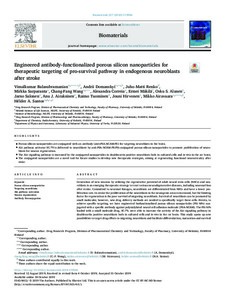Engineered antibody-functionalized porous silicon nanoparticles for therapeutic targeting of pro-survival pathway in endogenous neuroblasts after stroke
Ermei Mäkilä; Juho-Matti Renko; Raimo Tuominen; Chang-Fang Wang; Vimalkumar Balasubramanian; Mirkka Sarparanta; Jarno Salonen; Andrii Domanskyi; Mikko Airavaara; Alexandra Correia; Jouni Hirvonen; Hélder A. Santos; Osku S. Alanen; Anu J. Airaksinen
Engineered antibody-functionalized porous silicon nanoparticles for therapeutic targeting of pro-survival pathway in endogenous neuroblasts after stroke
Ermei Mäkilä
Juho-Matti Renko
Raimo Tuominen
Chang-Fang Wang
Vimalkumar Balasubramanian
Mirkka Sarparanta
Jarno Salonen
Andrii Domanskyi
Mikko Airavaara
Alexandra Correia
Jouni Hirvonen
Hélder A. Santos
Osku S. Alanen
Anu J. Airaksinen
ELSEVIER SCI LTD
Julkaisun pysyvä osoite on:
https://urn.fi/URN:NBN:fi-fe2021042825751
https://urn.fi/URN:NBN:fi-fe2021042825751
Tiivistelmä
Generation of new neurons by utilizing the regenerative potential of adult neural stem cells (NSCs) and neuroblasts is an emerging therapeutic strategy to treat various neurodegenerative diseases, including neuronal loss after stroke. Committed to neuronal lineages, neuroblasts are differentiated from NSCs and have a lower proliferation rate. In stroke the proliferation of the neuroblasts in the neurogenic areas is increased, but the limiting factor for regeneration is the poor survival of migrating neuroblasts. Survival of neuroblasts can be promoted by small molecules; however, new drug delivery methods are needed to specifically target these cells. Herein, to achieve specific targeting, we have engineered biofunctionalized porous silicon nanoparticles (PSi NPs) conjugated with a specific antibody against polysialylated neural cell adhesion molecule (PSA-NCAM). The PSi NPs loaded with a small molecule drug, SC-79, were able to increase the activity of the Akt signaling pathway in doublecortin positive neuroblasts both in cultured cells and in vivo in the rat brain. This study opens up new possibilities to target drug effects to migrating neuroblasts and facilitate differentiation, maturation and survival of developing neurons. The conjugated PSi NPs are a novel tool for future studies to develop new therapeutic strategies aiming at regenerating functional neurocircuitry after stoke.
Kokoelmat
- Rinnakkaistallenteet [19207]
